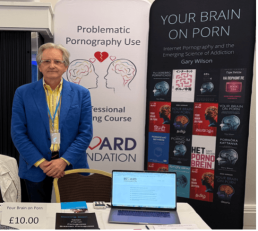No. 21 Summer 2025

Hello, Summer!
I hope you are enjoying the longer evenings and sunshine.
The latest news from us includes:
- success for age verification/assurance across the board
- review of a fabulous new workbook by a leading psychiatrist about how to overcome addiction and compulsive use of substances and behaviours
- new research about sex differences in problematic porn use among adolescents
- tips on how to recognise autism
- what TRF has been getting up to in the media and at conferences.
Keep using our free lesson plans – we’d love to have your feedback about how you are employing them. Likewise spread the word about our free online, self-paced course for professionals about problematic porn use. Don’t forget our free parents’ guide to internet pornography too. If you are a policy wonk, make sure you read our research paper: Problematic Pornography Use: Legal and Health Policy Considerations. This paper has been viewed over 151,000 times, putting it into the top 3% of research papers published in the past decade.
Best wishes from all the hardworking team at The Reward Foundation.
Success for age verification/assurance across the board
Success for age verification/assurance across the board

Go USA!
Previously we told you about how The Reward Foundation was taking part by way of an amicus brief in a historical court case at the Supreme Court of the United States against the porn industry. The case is called the Free Speech Coalition Inc.-v- Paxton, Attorney General of Texas. We’re delighted to report that after the hearing in January this year, the justices published their judgement in June. We won! Here is our blog on it.
Age verification in Europe
On 17 June 2025 the EU Parliament also approved a directive that includes mandatory age verification measures for pornographic websites to protect minors. It happened during the debate on the Directive on Child Sexual Abuse Material (CSAM). The directive also includes criminal penalties for disseminating pornographic content without these age verification measures, with a maximum imprisonment term of at least one year. Additionally, the European Commission is working on an EU-wide age verification app planned for lunch in mid-2025. It is a temporary solution until the EU Digital Identity Wallet becomes available by the end of 2026. This app is intended to be privacy-preserving, user-friendly, and interoperable with national digital infrastructures.
Online Safety Act
On 25 July 25, the UK government will implement its age verification regulations as part of the Online Safety Act. These measures are designed to protect children from easy access to hardcore violent pornography that is damaging to so many young people at a critical stage of their sexual and social development. Let’s hope that the regulator, Ofcom, will keep a sharp eye on the porn industry leaders who have done so much to delay this key legislation.
New Book Review

The Official Dopamine Nation Workbook- A Practical Guide to Overcoming Addiction in the age of Indulgence by Dr Anna Lembke, Headline press.
This is by far one of the best books available on the market with tools on how to recover from any form of compulsive use of, or addiction to, a substance or behaviour. These include: porn; gaming; gambling; social media; dating apps; junk food; exercise; alcohol; nicotine; energy drinks; and narcotics. This is the missing operating manual for our brain and how to drive it in today’s age of overindulgence.
Dr Anna Lembke is a Professor of Psychiatry at Stanford University School of Medicine. She uses her two decades of experience as a clinician to explain the risks we all face today from overstimulation and overindulgence and ways to control them. This workbook builds on her previous NYT bestselling book “Dopamine Nation- finding balance in the age of indulgence”.
Dopamine is the neurochemical that spurts for novelty, wanting and craving. The reward system is responsible for pleasure and pain, and seeks balance (homeostasis). What goes up, must come down. But when dopamine drops below its baseline, it leaves a user feeling irritable. Over time dopamine stays below baseline making the user anxious and depressed. Abstinence is the best way to get back to normal.
Your Brain on Porn
The book complements Gary Wilson’s ‘Your Brain on Porn- Internet pornography and the emerging science of addiction’. His book was the first to set out what porn addiction looks like and how to overcome it.
“The more dopamine a substance or behavior releases, and the faster it releases dopamine, the more addictive that substance or behavior is.” (p. 43.DN workbook). Internet porn releases huge amounts of dopamine in users given their easy access to endless new short videos that are hyperstimulating.
Lembke reveals her own challenges with erotic romance novels- a favourite form of porn for women. She points out the tell-tale signs of addiction by hiding her use, lying about her use and passing up social occasions to be able to indulge in it. She talks too of her struggles as a mother. Lembke found herself being too worried about her children to actually be present with them and willing to listen to them. Her warm, authoritative book offers a step-by-step guide to quitting damaging behaviours or substances. It’s a must for everyone.
For those who prefer podcasts she’s done an excellent one with Steve Bartlett on Diary of a CEO. He says it is the most important interview he’s ever done. She also appeared with fellow Stanford professor Andrew Huberman in the Huberman Lab.
Public health campaign
Surely this book’s thesis explains the widespread rise in mental health problems across our nation too? If people are self-soothing life’s inevitable stresses with combinations of porn, gaming, social media, junk food, gambling, alcohol, nicotine, shopping, dating apps etc. then the worsening rates of depression and anxiety may be the result of the brain’s adaptation to the bombardment of dopamine through constant stimulation.
It’s easy to blame the government and everyone else when life looks bleak. But how far are we responsible for our own misery? If we’re sure we’re not affected, let’s try experimenting with quitting for a couple of weeks. This makes it easy to see in fact if we are hooked to that particular coping mechanism.
The government would save billions of pounds on the NHS costs if it did a sustained public health campaign around addiction and compulsive behaviours showing how much we can help ourselves.
New Research
Sex differences in problematic pornography use among adolescents: a network analysis https://link.springer.com/content/pdf/10.1186/s40359-025-02624-0.pdf
Excerpt:
“Males were found to consume pornography more frequently and in a more problematic manner, potentially reinforcing gender stereotypes about female sexuality. In contrast, while females reported lower levels of pornography use, they experienced significant associated concerns, such as increased likelihood of experiencing online sexual abuse or victimization and heightened feelings of loneliness.”
Tips on how to recognise autism

As the UK government announces cuts to individual learning plans for pupils with special needs, we need to ask ourselves how many are truly autistic in the clinical sense. Are their symptoms being confused with ‘virtual autism’ or ‘electronic screen syndrome’ which arise over time as a result of internet addiction and mimic the characteristics of real autism?
Here are some tips on recognising real autism. This guidance builds on the work of Gill Merrill, a Consultant Forensic Psychologist specialising in identifying autism and learning disabilities. She is a practitioner whose goal is to assist and educate those on the autistic spectrum and help others who may come into contact with them recognise and understand autism. See our blog for the full article.
What TRF has been getting up to in the media and at conferences?

TRF in Manchester
In April TRF took part in the Building Bridges: Collaborative Approaches to Addressing Sexual Violence annual conference in Manchester. It was hosted by the St Mary’s Sexual Assault Referral Centre. This time we were networking and making our materials available to a huge audience from a variety of services directly involved with sexual violence. See photo above with Dr. Darryl Mead showcasing our materials. It was great to be part of this effort to reduce the epidemic of sexual violence we see today.
“Adolesence”
On 3rd June, our CEO gave a keynote speech “Porn and the Adolescent Brain” at the Beira’s Place* conference “Should We Have Done Better? How social media and influencers can promote and fuel violence against women and girls”. Mary had the opportunity to critique the hugely successful Netflix series Adolescence which had inspired the title of the conference.
Basically, the script writers had unwittingly omitted one of the key drivers of sexual violence against women and girls, namely internet pornography. Focusing on Andrew Tate and the like is a red herring. He is a minor, albeit infamous, player in this multi-billion-dollar industry. We know of this omission from Adolescence because the sister of one of the script writers attended a conference in England in May about porn and the adolescent brain where she learned how it was a critical contributing factor to youthful sexual violence. She passed on the information. Happily the script writers have agreed to include porn’s impact in Season Two.
The fact that porn harms, especially in young people, aren’t widely known about is further proof of how successful the porn industry has been thus far in suppressing evidence of those harms in the mainstream and online media.
If you know of a good journalist who is willing to expose the campaign of disinformation (which we have written about previously) and the ongoing attacks on educators who seek to make the health risks known, please let us know.
*Beira’s Place is a Scotland-based private support service for female victims of sexual violence. It was founded in 2022 by J. K. Rowling. The organisation describes itself as a “women-only service”, and does not hire or provide services to transgender women.
TRF in The Sunday Times
The Sunday Times did a story on 7 December 24 called “The Scots lawyer taking on the porn industry”. It was about our CEO’s amicus brief to the US Supreme Court. Apart from a few factual errors, it was overall a reasonable piece. We were one of 27 organisations filing an amicus brief. Unhelpfully, in the article we were compared to a Christian group whom we knew nothing about until we read about them there. Hinting that we are moral crusaders rather than science educators walks into the trap set by the porn industry in their campaign to misrepresent us and our evidence-based work.
Any hint of an attack on the porn industry results in an immediate response from their main aggressor, a woman sexologist who doesn’t see clients. Her main pursuit is collaborating with the porn industry.
After delivering extensive abuse, she reported the journalist to the Independent Press Standards Organisation. This type of intimidation is aimed at suppressing information about porn harms to preserve the porn industry’s profits. It is designed to frighten journalists and their editors into not writing about this important subject. Porn is a defective product that causes harm to many users, especially young people. It is sex negative and far from sex positive as the industry so often asserts.
Scotcast

The Sunday Times story was taken up by BBC Scotland and our CEO Mary Sharpe was invited to do a podcast as part of the new BBC Scotland Scotcast. You can watch and listen in the link.


